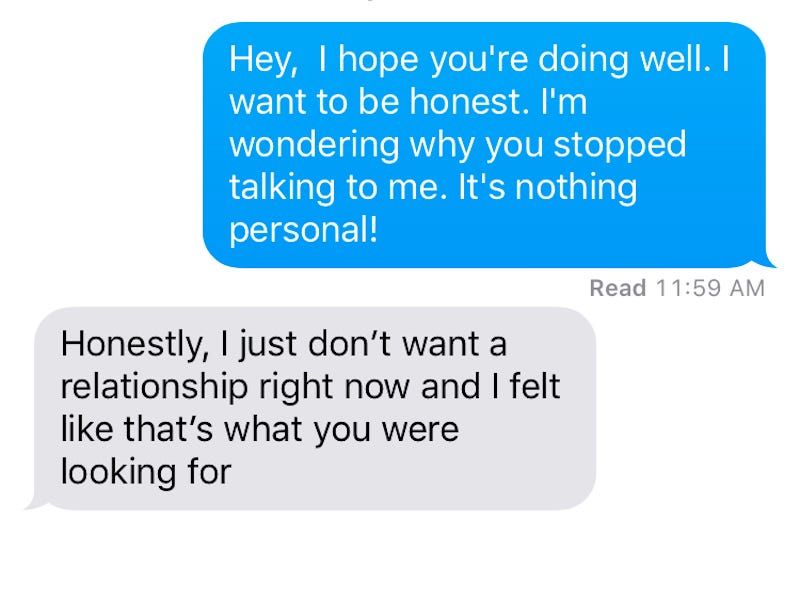You never really forget that feeling—the cold hush in your chest when your phone stays silent, the way hope mixes with confusion, then sours into something sharp. Ghosting isn’t just an awkward end. It’s a heartbreak that rewrites the story you thought you were living.
If you’re here, maybe it’s because someone you trusted slipped out of your life with nothing but digital footprints and silence. Maybe you’re angry, or just tired of trying to connect the dots. Estou a perceber. And I won’t give you empty comfort or slapstick advice.
Em vez disso, I want to hand you real clues, the kind that finally make sense of the madness. Seven signs that you’re not imagining things. Ten ways to fight for your own peace, even when you’re left holding the quiet.
Let’s get honest about ghosting—what it means, what it steals, and what you can do to get yourself back.
1. Sudden Radio Silence
It starts like this: one day, your phone pings with laughter, updates, plans that feel halfway real. Then, overnight, everything stops. You stare at a blank screen, wondering if you missed something obvious.
You tell yourself, maybe they’re busy. Maybe you said too much, or too little. Days pass and the silence stretches until it’s a wall. It’s not just the quiet, it’s the weight—the slow realization that the connection you trusted has unraveled without warning.
There’s a kind of grief in that sudden emptiness. It’s the moment you stop making excuses for someone who’s already gone. That’s when you realize: silence can be the loudest answer you’ll ever get.
2. Unanswered Messages
You remember the exact message. Maybe something funny, a tiny confession, or just a basic “hey.” Minutes ticked by, then hours, and still nothing. There’s that little read receipt—it sits there, a bruise on the day.
You start to imagine reasons: lost phone, bad signal, sudden emergency. But deep down, you know. The message wasn’t lost. It was ignored. That hurts in a way that’s hard to explain to someone who’s never waited for a reply that would never come.
It’s not childish to want a response. You’re not needy for caring. There’s nothing more unsettling than watching your words just hang there. It’s the digital version of being left mid-sentence.
3. Avoidance of Plans
It happens gradually, like a slow fade. Remember all those plans—movies, dinner, just a simple walk? Suddenly, they start getting canceled. Sometimes with an excuse, more often with nothing at all.
You find yourself double-checking your messages, replaying every conversation for a clue. There never is one. The other chair stays empty, and so does your calendar. People think ghosting is just digital, but it shows up everywhere, even in the space across from you.
That avoidance eats at your confidence. You start to wonder if you’re too much, or not enough. But the truth is, their absence is about them—not you.
4. Social Media Withdrawal
One day you’re tagged in their photos, laughing together like some low-budget sitcom cast. The next, your notifications fade, and their likes disappear. Maybe they even unfollowed, or blocked you altogether.
It’s more than digital housekeeping; it’s a statement in pixels. Social media is where people curate lives, and now you’re airbrushed right out of theirs. That emptiness isn’t just on your profile—it settles somewhere deeper.
You catch yourself scrolling anyway, hoping for a sign. There’s none. It stings, but it’s proof: they’ve chosen absence in public, too. At times, ghosting goes viral in your own life story.
5. One-Sided Communication
You sent the meme. You checked in after their big day. You asked how they slept. At some point, it’s all you. There’s no conversation—just you tossing messages into the void.
That imbalance gets heavier over time. It’s exhausting to always reach out, to keep hope flickering with every attempt. You start to realize your effort is the only thing keeping the connection alive.
It’s like being on stage for an audience that left hours ago. The applause never comes, just your own echo. That’s when you know: the relationship ended for them, even if they never had the guts to tell you.
6. Vague Excuses
At first, the excuses sound reasonable. Work got busy. Their phone powered down. Something came up. You accept it because you want to believe it’s true, not just convenient.
But the stories get thinner, the gaps wider. And always, there’s some vague promise—“maybe next week,” “let’s see”—that never materializes. You start to recognize the pattern, even as you wish you were wrong.
Here’s the twist: people who want to be in your life find a way. If their explanations never add up, it’s not miscommunication. It’s avoidance, plain and simple. That realization? Both freeing and painful.
7. That Gut Feeling
You can’t prove anything. No receipts, no evidence—just a growing sense of wrongness, like a warning bell somewhere inside you. You lie awake, replaying moments, searching for something solid.
Maybe you try to shake it off. But the intuition lingers, whispering that you’re not just being paranoid. Once in a while, your body knows the truth before your mind catches up.
Trusting your gut can feel reckless, but it’s usually right. That sense of disconnection isn’t imaginary; it’s your instincts shouting from the sidelines. Listen, even if you wish you couldn’t hear them. Because, once you figure out you are ghosted, a bigger question comes to mind: What to do next?
1. Acknowledge Your Feelings
You don’t owe anyone a stoic face. You have a right to feel exactly what you feel—messy, angry, blindsided, or just plain sad. Stuffing it down only adds to the confusion.
Journaling, ugly crying, or just saying it out loud to a friend is valid. There’s no badge for pretending you aren’t hurt. Honesty with yourself is the first crack in the armor that pain builds up.
Naming your feelings doesn’t make you weak. It lets you move through them instead of getting stuck. You’re not dramatic—you’re just human, and that’s powerful.
2. Don’t Take It Personally
Here’s the truth nobody tells you: ghosting is almost always about them, not you. Their silence is their problem, not your failure. I know it’s easier said than believed.
When someone drops out without a word, it reflects their limits—emotional, social, sometimes even maturity. It says nothing about your worth, your lovability, or your realness. I wish I’d understood that sooner.
You’re not broken or unworthy. You just crossed paths with someone who wasn’t ready, or honest. That’s on them. Leave their baggage at their door, not yours.
3. Avoid Overanalyzing
It’s tempting to play detective: replaying conversations, decoding emojis, searching for the moment it all went wrong. But obsessing over every detail is a trap, not a rescue mission.
You will drive yourself wild hunting for answers that probably don’t exist. The “why” of ghosting usually lives in someone else’s discomfort—not your actions. Save your energy for healing, not guessing.
Letting go of the need for explanations is hard, but it’s like finally exhaling after holding your breath. What happened was real, but it’s not the end of your story.
4. Set Your Boundaries
Think of it as your emotional lock. You get to decide who gets access, who stays muted, and who gets the boot. This can be the nudge you needed to protect your space.
Sometimes, that means unfollowing, blocking, or muting. Sometimes, it’s just refusing to send another unanswered message. Setting boundaries isn’t spiteful—it’s self-respect.
The first time you draw that line, you’ll feel exposed. The next time, you’ll feel powerful. It’s your peace you’re defending, and it’s worth every ounce of awkward.
5. Talk to Someone Safe
The relief in finally saying, “This sucks,” out loud can’t be overstated. Keeping the pain bottled up just lets it fester and grow teeth. You need someone who’ll listen, not fix.
At times, you don’t need advice. You just need to be heard and believed. There’s magic in a friend who says, “Yeah, that’s awful. You deserved better.”
Whether it’s a sibling, a therapist, or your favorite group chat, lean in. Connection is the antidote to isolation. Let yourself be comforted for once.
6. Rediscover Self-Care
Remember what you loved before your phone became an emotional booby trap? That playlist, those books, your weird little hobbies—they’re all still here for you. Self-care isn’t just spa days; it’s giving yourself a break from the emotional minefield.
Go for a run, cook your favorite meal, watch trash TV. Celebrate the tiny wins—getting out of bed, smiling at a stranger, remembering to eat. It counts, all of it.
Every act of kindness toward yourself is a quiet rebellion against disappearing for someone else’s comfort. Fill your cup, even if it’s drop by drop.
7. Reflect and Learn
You can’t change what happened, but you can learn what you want to protect next time. Reflection isn’t about blaming yourself. It’s about noticing patterns—what you ignored, what you craved, what you never want to settle for again.
Sometimes, the lesson is as simple as trusting your gut sooner. Sometimes, it’s about not making yourself small just to fit someone else’s attention span. There’s power in seeing yourself clearly, scars and all.
Growth isn’t always pretty. But it means you’ll walk into your next chapter a little more awake, and a lot more yourself.
8. Find Closure Within
Closure doesn’t always come wrapped in neat explanations. On occasion, it’s just you deciding the story ends here—not because you got answers, but because you chose peace over waiting.
You won’t get an apology or a final text. You don’t need one. The real closure is the moment you stop checking your phone for signs of life that aren’t coming.
You’re allowed to move forward with questions still unanswered. That’s not resignation—it’s self-respect. You give yourself what they never could: dignity and a soft landing.
9. Set Clear Relationship Standards
Think of boundaries not just as fences, but as welcome mats for the right people. After getting ghosted, you see what you’re no longer willing to tolerate. Write it down if you have to.
Decide now: What’s non-negotiable for you? How do you want to be treated? This isn’t about being rigid—it’s about honoring your humanity.
You aren’t asking for too much. You’re just asking for the baseline: honesty, effort, presence. Setting standards protects your heart for people who deserve it. That’s a gift to your future self.
10. Chase Your Own Goals
Few things heal like purpose. Take all the energy you spent waiting for someone else and aim it at your own dreams. Want to run a 10k, learn Spanish, start that blog? Now’s your shot.
Ghosting can leave you feeling powerless, but having a goal gives you something no one can take from you—momentum. Every step, every tiny win, is a reminder that your story moves even without them.
Progress is messy. You’ll trip, fall, doubt yourself. But your life belongs to you. The best part? You get to decide what happens next.


















